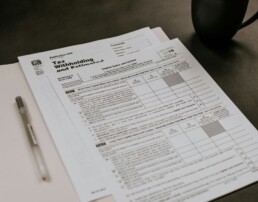Ross McGill
Your W-8 Questions Answered
In our last blog about W-8 forms, we talked a bit about what they are and what they’re used for. We got a lot of questions about W-8 forms off the back of that post, so today I thought it would be a good idea to gather some of them together and answer them. I promise I’ll do my best to not answer each one with ‘it depends’!
If you need an update on the basics of a W-8, click here to read the last article. Otherwise, let’s get into it.
Who Needs to Complete W-8 Forms?
Any non-US investor trying to open an account with a broker or a custodian bank will almost certainly be asked to provide a W-8 (or a W-9 if they’re American). The institution will ask you to fill one in or collect the information they need from their website (called a substitute W-8).
Which Countries Have Double Tax Treaties with The US?
This is a tricky one because double-tax treaties are changing all the time. However, I can tell you that at the time of writing, there are approximately 65 countries that have a tax treaty with the US. Get ready for a long list, because that includes:
- Armenia
- Australia
- Austria
- Azerbaijan
- Bangladesh
- Barbados
- Belarus
- Bulgaria
- Canada
- Chile
- China
- Cyprus
- Czech Republic
- Denmark
- Egypt
- Estonia
- Finland
- France
- Georgia
- Germany
- Greece
- Iceland
- India
- Indonesia
- Ireland
- Israel
- Italy
- Jamaica
- Japan
- Kazakhstan
- Korea
- Kyrgyzstan
- Latvia
- Lithuania
- Luxembourg
- Malta
- Mexico
- Moldova
- Morocco
- Netherlands
- New Zealand
- Norway
- Pakistan
- Philippines
- Poland
- Portugal
- Romania
- Russia
- Slovak Republic
- Slovenia
- South Africa
- Spain
- Sri Lanka
- Sweden
- Switzerland
- Tajikistan
- Thailand
- Trinidad
- Tunisia
- Turkey
- Turkmenistan
- Ukraine
- Venezuela
- United Kingdom
- Uzbekistan
When And Where to Submit Your W-8
No one submits their W-8 or W-8BENEs directly to the IRS. Instead, you send them back to the institution that requested it. They will then be used by the institution to decide whether to let you open an account, how to treat and tax US investment income paid to your account and whether your account is reportable under US anti-tax evasion regulations.
What’s The Difference Between W-8 And W-9 Forms?
Just to add in another issue, there’s also a W-9 form. Thankfully, it’s easy to differentiate the two.
W-8 forms are for non-residents of the US only. That includes international students, who will need to file a W-8BEN where necessary.
W-9 forms are for citizens and residents of the US. So if you’re a US resident for tax purposes, then you’ll need to provide a W-9.
How Long is a W-8BEN Valid For?
It does depend (sorry).
Provided none of the details on the form change, your W-8BEN will be valid for three calendar years from the end of the year in which you sign it. So, if you completed the form on the 28th of March 2024, it will be valid until the 31st of December 2027.
There is another quirk of the system, but it shouldn’t affect you. Your financial institution is collecting these W-8s to document your tax status under two different “chapters” of the US Internal Revenue Code – Chapter 3 and Chapter 4. The quirk is that if your financial institution is only collecting the W-8 solely to document your Chapter 4 status, then the form is valid indefinitely or until you have a change in circumstances. The three-year validity rule only applies if you’re expecting to receive US investment income into your account, so the financial institution needs to know your Chapter 3 status too.
What’s The Difference Between a W-8BEN and a W-8BENE?
There are a few differences between the W-8BEN and the W-8BENE. The main one is that the W-8BENE is the form for ‘entities’, meaning any type of business or other type of institution that has more than one owner. That could be a corporation, certain types of partnership or trust, exempt entity, public and private foundations, international organisations and even foreign governments.
The default US tax rate for income received by foreign businesses is 30%, but this form will allow the business to receive a tax treaty reduction if it’s applicable and if it’s properly claimed on the form. In particular, the entity has to make a certification on the form to show that it meets what is called the limitation on benefits test.
The W-8BEN on the other hand, applies to income paid to individuals. So while the outcome is similar, the forms are aimed at different categories of people and types of account holders.
We went over these differences in more detail here.
What Happens If I Fill in the Form Incorrectly?
There are estimated to be around 900 million W-8s in circulation and about 30% are completed incorrectly in Europe. That failure rate rises to about 70% in Asia. That’s because it’s an American tax form, it’s not simple and it’s not written in plain English. Differences in language, culture and levels of understanding can affect whether you understand what you’re signing.
The big thing to recognise is that the form is signed under penalty of perjury. This means that if you fill the form in incorrectly, whether that’s deliberate or accidental, and your financial institution taxes your US income at the wrong rate, you’re the one on the hook for liability, not them.
In the end, most financial institutions are very conservative. If there is any doubt, they will tax at the maximum rate of 30%. That means that you may be over-taxed through no fault of your own. In such cases, if your financial institution is a qualified intermediary (QI), then you can ask them for a refund because their contractual agreement with the IRS obligates them to do so. If they are not a QI, then you can, in theory, file a claim directly to the IRS for a refund. The process is not simple or quick and you’ll need to ask your financial institution for a form 1042-S to prove that they over-taxed you. Then, if you’re an individual, you can file a claim on a form 1040-NR together with your 1042-S (and other supporting evidence). If you’re filing a reclaim request for an entity that was over-taxed, the form will be an 1120-F.
Who Can Help Me?
Us! At TConsult we have over 20 years’ experience in the financial services industry, particularly dealing with US withholding tax and all that comes with it. Our subject matter experts have detailed knowledge of the governments and financial institutions in over twenty-seven countries, making us perfectly placed to handle your W-8 questions and support you through the process.
We created an online platform for W-8 forms to be used by financial institutions. So, if you work for a financial institution that provides access to the US securities markets, you should get a demonstration of our Investor Self-Declaration (ISD) system. This collects all the required information for a substitute of all the W-8 forms or W-9 and makes sure that you don’t make any mistakes.
If you would like to know more, or if you’re a financial institution struggling with compliance, or you have questions about a W-8, W-8BEN or W-8BENE, just get in touch with one of our experts today.
Articles
Gain deeper insight with articles that give our considered opinion and predictions of where the industry will go next.
Muinmos and TConsult ink deal over digital investor tax self-declarations
Muinmos and TConsult have signed an agreement to integrate TConsult’s Investor Self-Declaration platform (ISD) into Muinmos’ Client Onboarding Platform, enabling Muinmos’ clients, typically financial institutions, to automatically obtain ISDs instead of using multiple paper tax certification forms to document the tax status of their clients.
Training: The QI’s Achilles’ Heel
Training is an essential component of your obligations as a QI. In this article we explore what the QI Agreement says about training and how we can help you to deliver cost-effective training to everyone in your firm with a role in QI compliance.
Announcing the Tax Compliance Toolkit Training Academy
We are delighted to officially announce the launch of the Tax Compliance Toolkit Training Academy with our debut course: QI Essentials.
This course provides a foundation level understanding of the U.S. qualified intermediary regime and the role you play in helping your firm to be compliant with the terms of the QI Agreement. Find out how you can access the training...

QI Status – Is It Worth It?
June 1, 2020To QI, or not to QI? That is the question – and one we get asked about an awful lot. […]Read more

Deferral of FATCA and CRS Reporting Deadlines – Should You Be Taking Advantage?
May 20, 2020With the entrance of Covid-19, a lot of things have changed in the world, and a lot of extra stressors have piled on. And it's left firms wondering, should they take advantage of the defered FATCA and CRS reporting deadlines?Read more

TRACE: The next big tax thing
October 2, 2019Since Finland announced that it would be the first country to adopt the OECD’s The Tax Relief and Compliance Enhancement (TRACE) IP from 1st January 2021, there has been much excitement in the marketplace about the new regime and the opportunity it presents for financial institutions operating in global markets.Read more

Benefits of Being a US Qualified Intermediary: Malta Stock Exchange
December 21, 2018TConsult is delighted to announce that we have been invited to present a training course for the Malta Stock Exchange, where we will be delivering a two hour presentation discussing the benefits of being a US qualified intermediary at 9am on Monday 21st January 2019.Read more

Nationality, domicile, residency, citizenship and beneficial ownership
October 10, 2018We often find that linguistic issues can cause problems for firms looking to establish the correct withholding rate for their clients. In particular, we have seen the distinctions between nationality, citizenship, domicile, residency and beneficial ownership cause a degree of avoidable consternation. In this post, we present a quick reference guide.Read more

CorpActions2018 (London)
September 24, 2018TConsult's chairman, Ross McGill, will be appearing as a panelist at CorpActions2018 in London on Wednesday 3rd October alongside Mariano Giralt from BNY Mellon and Paola Deantoni from SG Securities Services to discuss tax and reporting, including inefficient withholding tax collection procedures, communication flow issues across cross-border capital markets, tax evasion regulation, where the responsibility for failures lies, and entitlements.Read more

Tax Congress for Financial Institutions (London)
September 17, 2018TConsult's chairman, Ross McGill, will be appearing as a panelist at the Tax Congress for Financial Institutions in London on Wednesday 19th September alongside Peter Grant from KPMG and Kevin Custis from Rathbones to discuss KYC, AML, Tax Avoidance and Tax Evasion in the Digital Age.Read more

FATCA Failures: Holistic compliance or just full of holes?
July 9, 2018In the last eighteen months we’ve conducted compliance reviews in five countries on twelve Tier 2 and Tier 3 financial institutions. In this post, we unpick the strategies we have seen firms use to approach their QI and FATCA obligations, and highlight the problems we have observed when firms fail to take a holistic approach to compliance.Read more

Your ‘Bible’ to Compliance
May 31, 2018The road to compliance is never ending and the IRS have certainly given us some interesting scenery to admire as we traverse the QI regulatory landscape. In this post we discuss the importance of a living compliance program, and highlight some of the IRS announcements that need to be reflected in your policies and procedures if you want to remain fully compliant.Read more

Validating W-8 Forms: Cultivating an Eye for Detail
March 12, 2018We are often asked what constitutes a consequential or an inconsequential error when validating a W-8 form. Some errors are obviously consequential, but what happens if an error appears relatively trivial, such as an incorrect date format? In this post, we explore how you can assess the risks involved and make a judgement about whether to reject or validate a W-8 form.Read more
Ross is the founder and chairman of TConsult. He has spent over 26 years working in the withholding tax landscape with companies developing tax reclaim software and operating outsource tax reclamation services.
Ross not only sees the big picture but is also incredibly detail oriented. He can make even the most complex issues simple to understand. He has authored 10 books (including two second editions) on various aspects of tax, technology, and regulation in financial services, making him one of the leading authorities in the world of tax.








